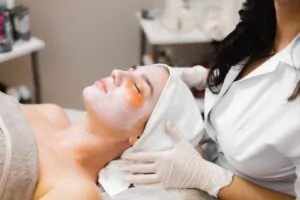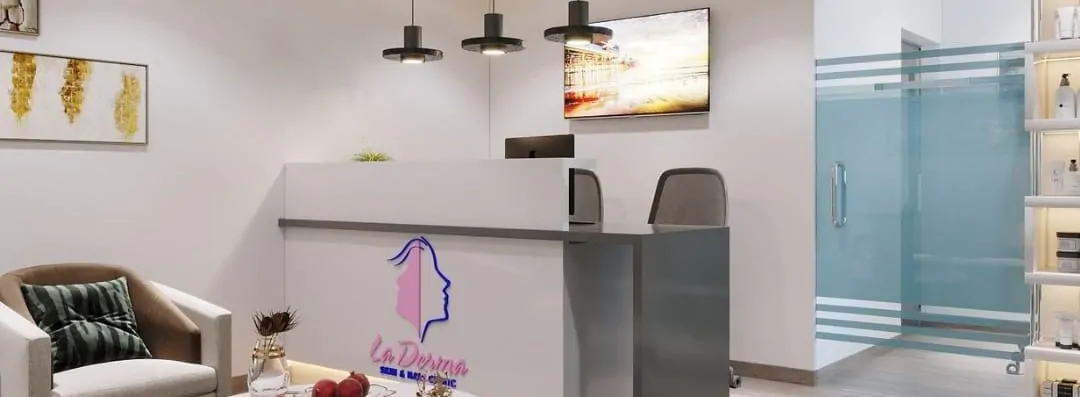Are Chemical Peels Safe?
Are Chemical Peels Safe: Considering a chemical peel to enhance and rejuvenate your skin? Here’s a comprehensive guide to understanding chemical peels.
In the dynamic beauty industry, new treatments emerge constantly. However, one enduring treatment known for its impressive outcomes is the chemical peel. The name might sound intimidating, conjuring images of harsh chemicals and discomfort. Despite the remarkable benefits chemical peels offer, many are hesitant due to misconceptions. So, are chemical peels safe, or should you avoid them altogether? Let’s explore!
What Is A Chemical Peel?

Chemical peels are skin rejuvenation procedures performed on the face, hands, and neck to enhance skin appearance and texture. In this treatment, chemical solutions are applied to the targeted area, triggering exfoliation and subsequent peeling of the skin. The purpose of this procedure is to eliminate the outer layer of skin, unveiling a smoother and more even complexion beneath.
Chemical peels are highly regarded for promoting skin health and achieving a radiant complexion. Additionally, they are employed to address a variety of skin concerns, such as:
- Wrinkles and fine lines
- Sun damage
- Acne scars
- Hyperpigmentation
- Scars
- Melasma
- Uneven skin tone or redness
What are the different types of chemical peels?
Are chemical peels safe, or do harsh chemicals pose a risk to your skin? Not all chemical peels are alike. Therefore, selecting the appropriate peel for your skin type and concerns is essential for optimal results. There are three main types of chemical peels:
- Superficial peels: These only penetrate the outer layer of the skin using mild acids like alpha-hydroxy acid.
- Medium peels: These utilize trichloroacetic or glycolic acid to reach the middle and outer skin layers.
- Deep peels: These fully penetrate the middle layer to remove dead skin cells.
The safety of chemical peels depends on the type of peel, the concentration of chemicals used, and the expertise of the skincare professional performing the procedure. When administered by a trained professional, chemical peels can be a safe and effective method for skin renewal.
Also Read:
Are there any risks associated with chemical peels?
Despite their popularity, are chemical peels really safe? Chemical peels can be daunting due to the strong concentration and potent chemicals involved in the process. Although generally considered safe for your skin, there are some risks associated with the procedure, including:
- Redness
- Swelling
- Temporary changes in skin color
- Infection
- Scarring
Where to get a chemical peel?
To fully enjoy the benefits of a chemical peel without risking skin damage, selecting the right clinic is essential. Choose La Derma Skin Clinic (Best Dermatologist in Kolkata) for an exceptional chemical peel experience. Explore a diverse range of peels to discover one that suits your skin type and requirements.
But are chemical peels safe at La Derma? The clinic features a team of highly qualified dermatologists with extensive experience in performing chemical peels. That’s not all! At La Derma Skin, each client receives a personalized treatment plan tailored to their specific skin issues and goals, ensuring optimal results.
So, are chemical peels safe? Absolutely, when administered by skilled professionals in appropriate conditions! Schedule your chemical peel appointment at La Derma today for a transformative skincare journey.
Also Read:
FAQ About Are Chemical Peels Safe?
1. What is a chemical peel?
A chemical peel is a cosmetic procedure used to improve the appearance of the skin on the face, neck, or hands. It involves applying a chemical solution to the skin, which causes the top layers to peel off, revealing smoother, less wrinkled skin underneath.
2. What skin concerns can chemical peels address?
Chemical peels can help improve various skin concerns, including fine lines and wrinkles, uneven skin tone, acne scars, sun-damaged skin, age spots, and mild pigmentation irregularities. They can also enhance skin texture and promote a more radiant complexion.
3. How does a chemical peel work?
During a chemical peel, a solution is applied to the skin, which causes controlled exfoliation of the outer layers. This process stimulates cell turnover and collagen production, leading to smoother, rejuvenated skin. The depth of the peel and type of solution used depend on the specific skin concerns being addressed.
4. What types of chemical peels are available?
Chemical peels are categorized into three main types based on their depth:
- Superficial peels: These are mild peels that target the outer layer of skin (epidermis).
- Medium peels: These penetrate the middle layers of skin (dermis) and are effective for more pronounced skin issues.
- Deep peels: These penetrate the deeper layers of skin and are used for significant skin rejuvenation but require more downtime.
5. What can I expect during and after a chemical peel?
During a chemical peel, you may experience a tingling or stinging sensation as the solution is applied. After the procedure, the treated skin may appear red and feel tight, similar to a sunburn. Depending on the depth of the peel, there may be mild to moderate peeling and flaking in the days following treatment.
6. Is a chemical peel suitable for everyone?
While chemical peels are generally safe for most skin types, they may not be suitable for individuals with certain skin conditions or sensitivities. It’s important to consult with a dermatologist or skincare professional to determine if a chemical peel is right for you and which type would be most beneficial based on your skin concerns and medical history.
Also Read:




